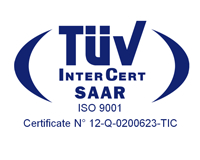Customer: European Community(6th Framework Program) – TelecomItalia S.p.A.
Duration: 2006-2009
The Project
 More and more frequently social interactions, and in particular group interactions, involve mediated communications. Nevertheles, we still know very little about the factors that determine the effectiveness of interactions, in particular about how the involved participants substitute the implicit and non-verbal signals, which play an important role in traditionally face-to-face communication. The mechanisms involved in traditional communication are well known, but which are the equivalent of these signals in a mediated environment?
More and more frequently social interactions, and in particular group interactions, involve mediated communications. Nevertheles, we still know very little about the factors that determine the effectiveness of interactions, in particular about how the involved participants substitute the implicit and non-verbal signals, which play an important role in traditionally face-to-face communication. The mechanisms involved in traditional communication are well known, but which are the equivalent of these signals in a mediated environment?
Very littele information is available on metiated communication. For example, we are not aware of the role of implicit non-verbal communication when this happens in a mediated environment. The hypothesys upon which PASION relies is that, in these environments, the messages will have completely new forms, and that such fomrs will be conditioned by group interactions in technological-mediated environments. Currently employed technologies are ineffective in conveying the social, contextual and non-verbal information, necessary for an effective and efficient communication. PASION will develop a an innovative shared virtual environment, where a pioneering mediated communication will take place.
The objective of this project is to develop forms of “augmented mediated communications” between network users, with new forms of information about the users (emotional state, their context – for example, their current positions and activities – their position inside their social network, and the global dynamics of the network). The assumptions underlying the project is that such increase may contribute to a more effective group interaction – both in professional situations (e.g., at work, in collaboration) and at leisure (e.g., “social networking online game”) . The project will design and develop new techniques to capture the information considered relevant to social communication.
During actual testing, a large community of users (adjusted to the needs of specific applications in the “collaborative work” and “social gaming”) will be used, in order to verify and validate the developed concepts, as well as in order to provide a strategic support for the activities of the working group, through the implementation of specific strategies based on the analysis of the feedbacks from the dynamics of social communication within the group.
RadioLabs activities
In the PASION Project, Radiolabs plays a twofold role regarding the integration of key components developed under the project, thus assuming the responsibility and the coordination of the activities of testing and software maintenance, the development of key components of the core system, and the validation of the components of peripheral systems.
The Partners
The Partners of PASION are:
- Telecom Italia S.p.A., Coordinator (TI)
- Eindhoven University of Technology (TU/e)
- University of London – Goldsmiths College
- Helsinki School of Economics – Center for Knowledge and Innovation Research (HSE)
- Helsinki University of Technology (HUT)
- Istituto Auxologico Italiano
- Informatics and Telematics Institute of the Centre of Research and Technology, Hellas (ITI-CERTH)
- Mediascore Gmbh (MEDIA)
- Siemens (SIEMENS)
- University of Bielefeld, Artificial Intelligence Group (UNIBI)
- University of Cologne, Department of Psychology (UCOL)
- University Jaume I of Castellon (UJI)
- University of Lincoln (ULINC)
- University of Padua (UNIPD)
- Universidad Politecnica de Valencia
- XiWrite S.a.S. (XIW)
Learn more




